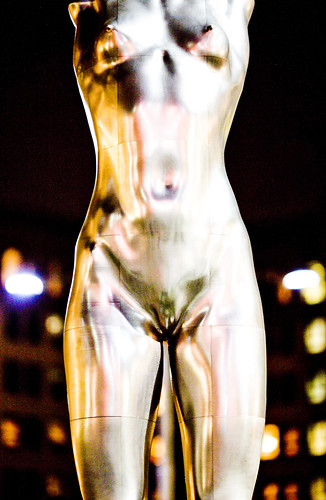On Christmas Day I walked up to Taksim. I had some time before meeting my dinner/drinking companion, so I wandered up and down Istiklal Street for awhile, then I went to sit on the railing in the little park in Taksim Square. It was dark and there was much activity, as you would expect on a Saturday night in central Istanbul, so I felt as I normally like to feel when I'm out in the city: anonymous, merging with the lights. I only sat on the railing for three minutes or so as it was greatly hurting my backside. I got up and started to walk towards the meeting place - the tram stop. As I got up, a young guy - he couldn't have been any more than university age - passed close to me, and half-breathed, half-crooned in honeyed tones into my ear (in English) "Who are you waiiiiiiting for?"
(The first thought that stormed through my head was, "How would you like me to rip off your **** and shove it down your throat?" If only I could have overcome my shock and rage in time, I really think I could have made him run. :)
Well, you wouldn't have thought I could be so conspicuous in the busiest part of a city of 15 million people, but there I was, a yabancı woman alone in a park, and this is marked in Turkey. I really love walking, but I don't do it much anymore. I have slowly become somewhat of a recluse and a hermit. I have periodic anxiety attacks. I don't understand why in my life I have to feel like a bug under a microscope.
This incident in itself is minor, but it comes on top of years of memories of old men throwing themselves half out of trucks and thrusting their tongues out, the gropes and 'rubbing ups' on the tram, the humiliation of trying to walk in a skirt past a group of watchful men in a windy city, the incessant interest in my tights, the men passing close enough to brush my body, the men trying to pin me against the wall at the bus stop in the morning, trying to force me to
take up less space, the men stopping in their tracks, turning and staring - and walking on, stopping, turning and staring, the men staring out the bus windows, raising their eyebrows expectantly before they understand the meaning of my middle finger, the young men circling me in the shopping centres, the workers on campus looking and laughing and looking again with their mates in the cafeteria, that unblinking lizard look, all the sleaze and intrusion of this endless, endless staring, I am Truman in the fishbowl, I am marked.
 'Mulled wine for the party' by fieldtripp, licenced under Creative Commons Attribution-Noncommercial-No Derivative Works 2.0.
'Mulled wine for the party' by fieldtripp, licenced under Creative Commons Attribution-Noncommercial-No Derivative Works 2.0.













